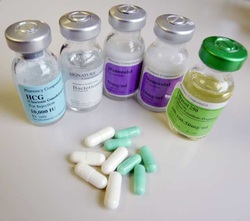
If your middle school or high school son is an athlete, you must take time to know what he is putting into his body. It is trendy (and common) today for even young athletes to take performance-enhancing drugs such as steroids, human growth hormones, or other lesser known (and nonregulated) supplements in order to gain either a competitive edge or stay even with other athletes.
Anabolic steroids are artificially produced hormones similar to male testosterone. There are over 100 variations of anabolic steroids all of which are illegal except with a prescription by a physician. Anabolic steroids stimulate muscle tissue growth by mimicking the effects of naturally produced hormones. They improve strength, endurance, and muscle mass. Serious and long-lasting effects of performance-enhancing drugs like anabolic steroids include health risks such as cancer, heart disease, stroke, and liver problems. Other side effects include premature hair loss or balding, mood swings (including anger, depression, and aggression), paranoia (including mania, psychosis, or suicide), high blood pressure, trembling, joint ache, and shortening of height.
Risks of Anabolic Steroid Use in Males
Testicular shrinkage
Pain when urinating
Breast development
Impotency
Sterility
Even legal, over-the-counter supplements may contain chemicals that have unknown effects on the human body. New technology is constantly giving us information on the side effects of these products. Unfortunately, the technology to test these products lags behind the production and marketing of new ones.
I have lifted weights and played sports for most of my life. I have also coached middle school and high school athletes for years. I am not a doctor or a nutrition expert, but it is my “unprofessional” opinion that if a high school athlete does not have health issues, he does not need to ingest anything beyond a well-balanced, healthy diet containing all the nutrients recommended by the Recommended Dietary Allowances, (RDAs), the United States Recommended Daily Allowances (USRDAs), and the dietary recommendations of Diet and Health (Committee on Diet and Health, 1989). Specific sports may require modifications of nutrient intake to meet the physiologic demands of that sport, but this should never include performance-enhancing drugs or supplements.
Take it upon yourself to investigate any products your son wants to ingest. Do not take your son’s word that it is okay. Do not even accept his coach’s permission or recommendation on a product without checking with your physician or other health care professional first. My experience has been that while there are some very good and knowledgeable coaches, many high school coaches are just teachers trying to pick up some additional income—they know less than many parents. And even though most parents of high school athletes think their children are good enough to receive a college scholarship, only a small percentage actually do. In addition, only a miniscule number of college athletes make the ranks of professional athletes. Your son’s long-term health is too important to risk for some short-term gain that probably will not do anything to benefit him in the long run.
This post was written by Rick Johnson. The original post can be found at: http://www.patheos.com/blogs/afewgrownmen/2014/01/the-dangers-of-steroids-for-boys/
 RSS Feed
RSS Feed